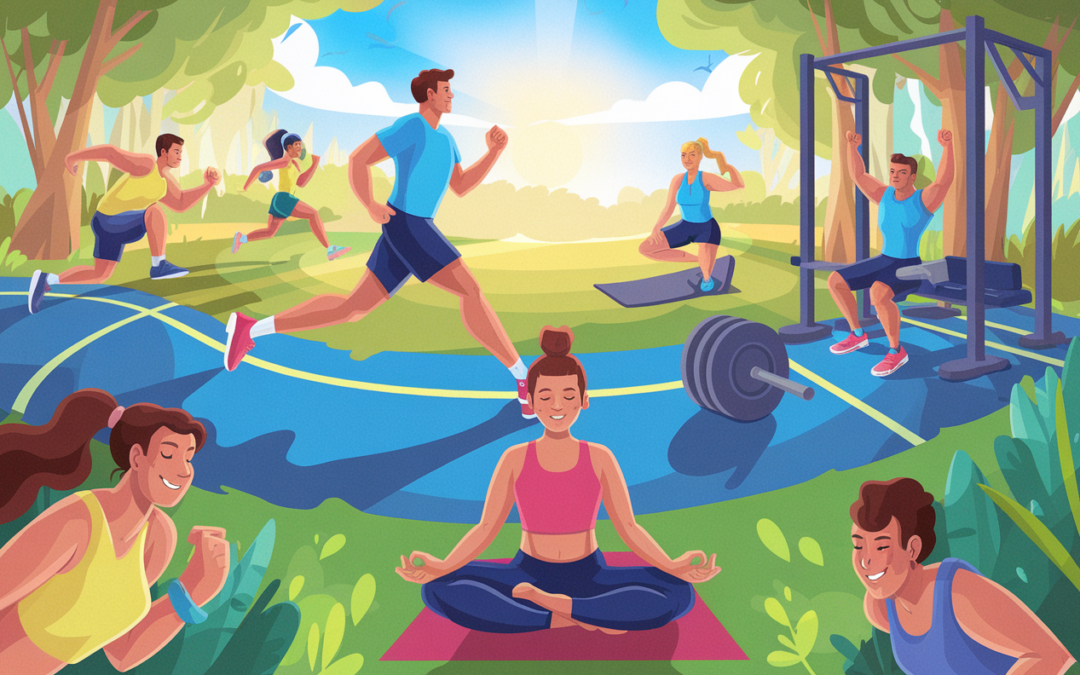Depression is one of the most common mental health disorders in the U.S., affecting millions of people every year. While therapy and medication are effective treatments, exercise is a natural, scientifically proven way to boost serotonin—the brain’s “happiness chemical.”
Regular physical activity can significantly improve mood, energy levels, and overall well-being. But which exercises work best for depression? In this guide, we’ll explore the top workouts that rapidly increase serotonin and help combat depression.
How Does Exercise Help with Depression?
Exercise impacts mental health in several key ways:
🔹 Boosts Serotonin & Dopamine
- Physical activity triggers the release of serotonin, dopamine, and endorphins, which promote happiness and relaxation.
- Low levels of serotonin are linked to depression, anxiety, and mood disorders.
🔹 Reduces Cortisol (Stress Hormone)
- Stress and depression often go hand in hand.
- Exercise lowers cortisol levels, reducing feelings of stress and worry.
🔹 Improves Sleep Quality
- Many people with depression struggle with insomnia or poor sleep.
- Exercise helps regulate sleep cycles and promotes deeper, more restorative rest.
🔹 Increases Energy & Motivation
- Depression often causes fatigue and low motivation.
- Regular movement boosts energy levels and improves cognitive function.
🔹 Enhances Brain Function & Neuroplasticity
- Exercise increases brain-derived neurotrophic factor (BDNF), which supports brain cell growth and mental clarity.
- This helps with cognitive function, memory, and mood stabilization.
Which Workouts Boost Serotonin the Fastest?
Certain exercises are more effective at rapidly increasing serotonin and reducing depression symptoms. Below are the best workouts for mental health:
1️⃣ Aerobic Exercise (Running, Cycling, Swimming)
🏃♂️ Best for: Quick serotonin release, mood boost, and long-term depression management.
- Duration: 30–45 minutes, 4–5 times a week.
- Why It Works:
✅ Increases oxygen flow to the brain, reducing brain fog and sluggishness.
✅ Boosts serotonin immediately after exercise and keeps levels elevated.
✅ Reduces anxiety and panic attacks.
📌 Quick Tip: Morning cardio workouts can set a positive tone for the entire day.
2️⃣ Strength Training (Weight Lifting, Resistance Training)
🏋️ Best for: Building confidence, reducing anxiety, and stabilizing mood.
- Duration: 45–60 minutes, 3–4 times a week.
- Why It Works:
✅ Triggers endorphins, leading to post-workout euphoria.
✅ Helps with self-esteem and body image, which are often affected by depression.
✅ Reduces stress and improves sleep patterns.
📌 Quick Tip: Lifting moderate to heavy weights for 8–12 reps per set is ideal for serotonin release.
3️⃣ High-Intensity Interval Training (HIIT)
🔥 Best for: Rapid serotonin boost, stress relief, and time efficiency.
- Duration: 20–30 minutes, 3–4 times a week.
- Why It Works:
✅ Provides an intense rush of endorphins and serotonin in a short time.
✅ Improves cardiovascular health and metabolic function.
✅ Great for people with busy schedules who need quick results.
📌 Quick Tip: A 20-minute HIIT session can be just as effective as a 60-minute moderate workout.
4️⃣ Yoga & Mindful Movement (Tai Chi, Pilates)
🧘♀️ Best for: Reducing stress, increasing serotonin, and improving emotional balance.
- Duration: 30–60 minutes, 4–5 times a week.
- Why It Works:
✅ Increases serotonin and reduces symptoms of anxiety and PTSD.
✅ Focuses on deep breathing and mindfulness, lowering cortisol.
✅ Improves flexibility, balance, and overall well-being.
📌 Quick Tip: Try hot yoga for an extra serotonin and endorphin boost.
5️⃣ Outdoor Activities (Hiking, Walking, Dancing, Sports)
🌿 Best for: Natural serotonin boost from sunlight and movement.
- Duration: 30–60 minutes, 3–5 times a week.
- Why It Works:
✅ Sunlight increases vitamin D, which enhances serotonin production.
✅ Nature exposure reduces rumination and overthinking.
✅ Encourages social connection, which is crucial for mental health.
📌 Quick Tip: A daily 30-minute walk outdoors can improve mood within one week.
Top 5 FAQs About Exercise & Depression
1️⃣ How Long Does It Take for Exercise to Improve Depression?
📌 Immediate Effects: You may feel better within 10–20 minutes of starting a workout.
📌 Long-Term Effects: Significant improvement in 2–4 weeks with consistent exercise.
2️⃣ Can Exercise Replace Antidepressants?
📌 Exercise is highly effective, but for severe depression, it’s best combined with therapy or medication.
📌 Some people can reduce medication with physician guidance.
3️⃣ What’s the Best Time of Day to Exercise for Depression?
📌 Morning: Best for mood stabilization and energy boost.
📌 Evening: Helps with stress relief and better sleep.
4️⃣ How Often Should You Exercise for Mental Health?
📌 150 minutes of moderate-intensity exercise per week is recommended.
📌 Consistency is key—even 10 minutes a day can make a difference.
5️⃣ Does Exercising Too Much Increase Depression?
📌 Yes, overtraining can cause burnout, stress, and fatigue.
📌 Stick to a balanced routine and listen to your body.
The Fastest Way to Boost Serotonin with Exercise
🚀 Top 3 Quickest Serotonin-Boosting Workouts:
1️⃣ HIIT (20-minute session) – Intense serotonin release.
2️⃣ Outdoor Running (30 minutes in sunlight) – Double serotonin boost from movement + vitamin D.
3️⃣ Strength Training (45-minute session) – Long-term mood stabilization.
📌 Best Combo for Depression: Mix cardio, strength, and mindfulness exercises for maximum benefits.
Final Thoughts: Move Your Way to a Happier Mind
- Exercise is a powerful, natural antidepressant.
- Consistency is more important than intensity—even short workouts help.
- Find activities you enjoy so exercise feels rewarding, not forced.
- Pair exercise with other lifestyle changes (sleep, nutrition, therapy) for the best results.
📢 Looking for guidance on managing depression? At Health Express Clinics, we offer expert mental health and wellness consultations to help you take control of your health.

